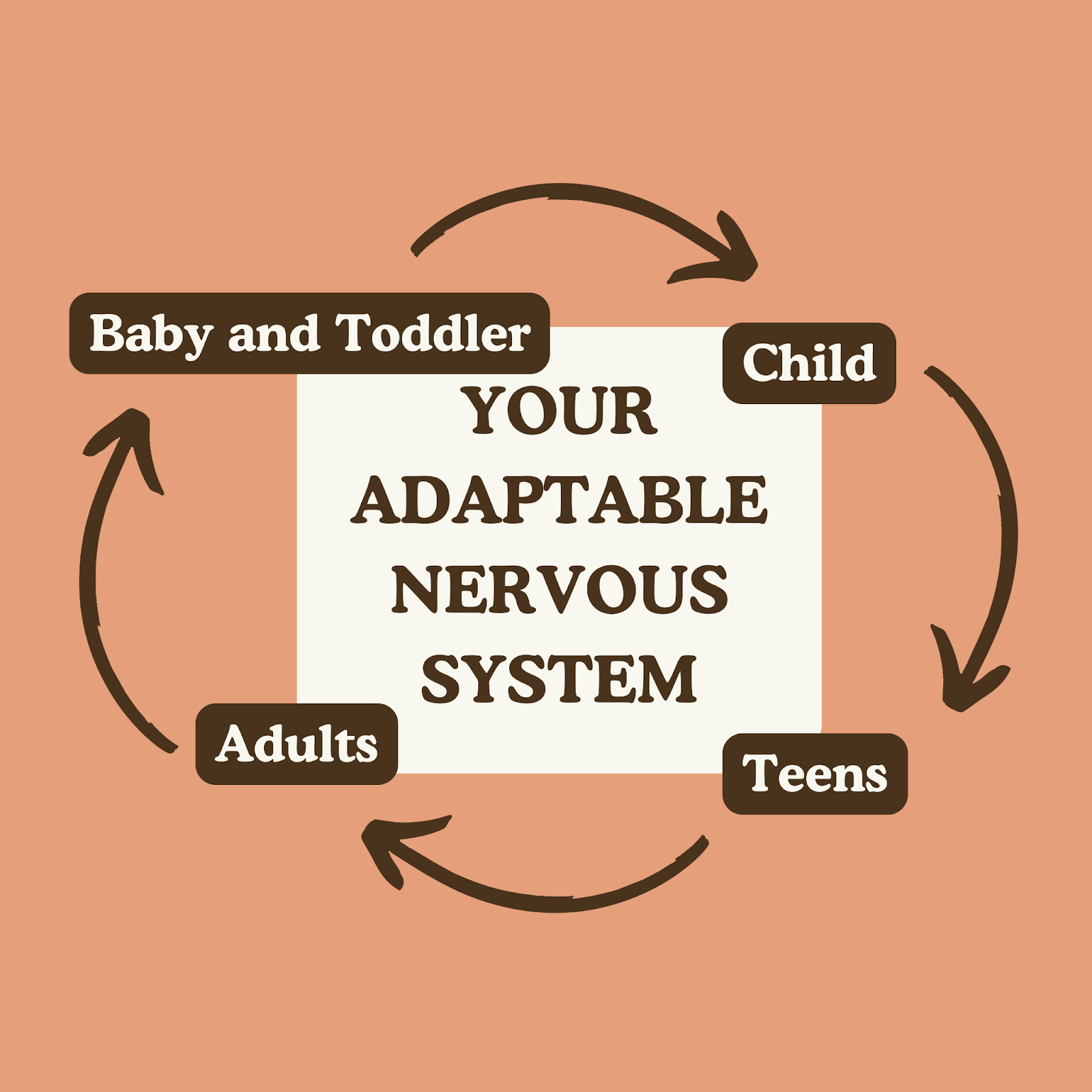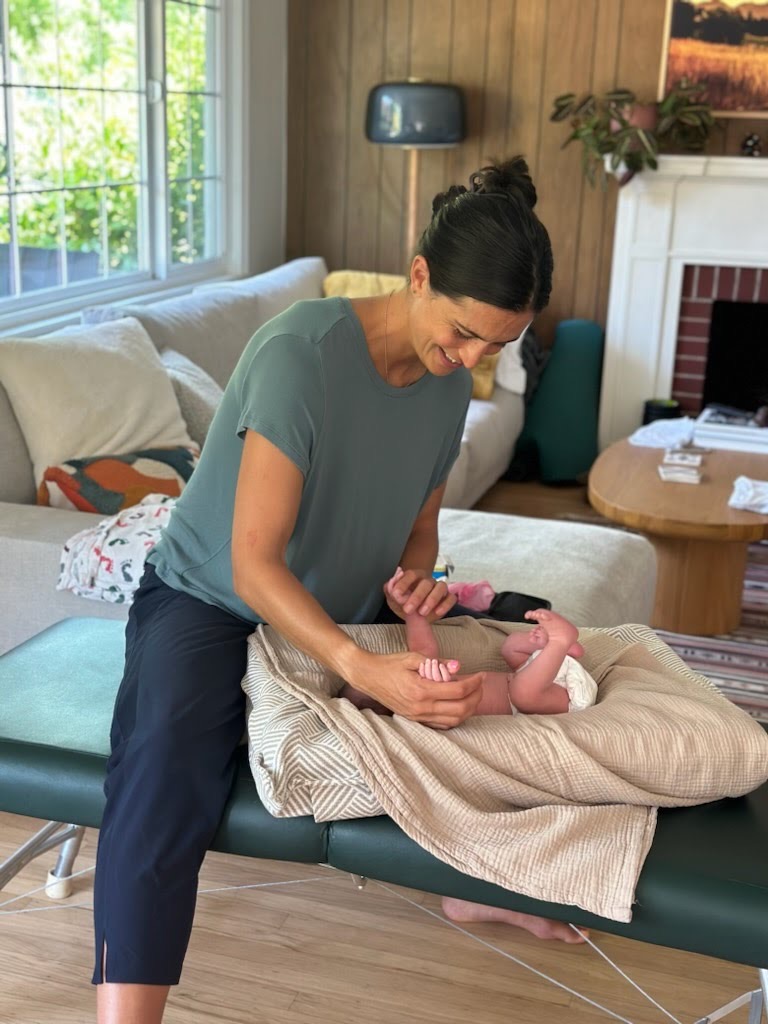The Brain-Body Connection: How Chiropractic Can Enhance Development from Infancy to Adulthood
By Dr. Gabby Bonfigli
Pediatric, Perinatal and Family Chiropractor at Flourish Family Chiropractic in Belmont, CA
As a family chiropractor, my number one job is to work with your nervous system. Why the nervous system? Let’s dive into it!
Chiropractic is a practice that works with your spine to help regulate and optimize your nervous system. It is a practice that is great for people of all ages, even babies! By working with your nervous system, the brain-body connection is improved.
The Brain-Body Connection
Our body is SO connected and this is all credit to your brain and spinal cord i.e your nervous system. Our brain communicates to our body via the spinal cord and nerves in order to survive. This communication influences your cells, heart, muscles, organs, digestion and so much more. The body also sends signals back to the brain about your environment. This could be information about temperature, balance, or how we want to move.
When the body has a variety of stressors, our spine adapts to them and our brain-body connection is altered. This may cause us to feel different symptoms such as headaches, trouble sleeping, ear infections, digestion issues, pain, etc. This is where my role as a chiropractor comes in. I work to analyze how the body is doing and ways where it can improve its spinal function. With better spine function comes better nerve function which means optimal conditions for development and growth for all ages.
Now let’s talk about these stressors. We all have them, but they may look a little different than we think.
Stressors on the Body
-
Physical - This is the way we treat our bodies. We may be very active or very sedentary. Both extremes can be tough on the body. We may also have a history of trauma from falls, accidents, broken bones, birth, surgeries, etc.
-
Emotional - This includes our thoughts, emotions and the way we think about ourselves in the world. Our daily thoughts affect how we feel, how we interact with our environment and how our body functions.
-
Chemical - This includes what we ingest and put on our skin. What we eat and drink has a HUGE influence on how we feel. This also includes fragrances, lotions, shampoos, soaps, air pollution, water, cleaning supplies, etc.
Our Capacity
I like to think of our nervous system and our ability to adapt to stressors as a large cup. When we have a low amount of stressors, our cup may be half full. As stressors start to pile up, our cup starts to fill. With a full cup, it only takes one small stressor to cause it to overflow. When we overflow our cup, we are unable to adapt to the stressors in our environment and we start to see different symptoms show up. Let’s explore how this affects us at different stages.

Nervous System Stress at Each Stage
Each category below is a different life stage. Rather than thinking of them as individual stages, read on to see how the nervous system stress compounds over time and how it can affect us and our kids.
-
Babies
-
-
The birth process is a BIG deal for a baby. All births including natural birth, c-section, forceps, and vacuum extractions put a lot of torsion and pressure on the baby's spine and nervous system. This stress can show up as the following: acid reflux, colic, torticollis, constipation, trouble sleeping, delayed milestones, and trouble latching and/or breastfeeding.
-
Kids
-
-
We may think that our baby outgrows the stressors and symptoms from above, but our body is smart and adapts over time. As kids this stress on our nervous system could show as the following: delayed milestones, constipation, hyperactivity, ear infections, coordination and balance troubles, illness, sleeping difficulty and more.
-
Teenagers
-
-
As we grow and develop, so does our brain and spinal cord. If there has been a disruption in the brain-body connection from a baby, chances are that it’s still there as a teen. Not to mention the new stressors such as heavy backpacks, sports, making friends and puberty. The symptoms for teens may show up as constipation/digestion trouble, ADD/ADHD, headaches, muscle aches and pains, chronic illness, inability to focus, irritability, and coordination troubles.
-
Adults
-
-
As an adult, we don’t always pay attention to our body and what it is trying to tell us. From birth, we have a lifetime of adaptations that is likely affecting our brain-body connection. As we age, it could look like the following: chronic pain, headaches, disease, fatigue, stiff and painful joints, physical limitations, recurring injuries/illness and more.

Supporting Your Nervous System
Now that we can identify if our nervous system may be stressed, what can we do about it? As humans, we like a variety of things and the same goes for our nervous system. A multi pronged approach can be best when trying to regulate and increase the capacity of our cup. Here are some of my favorites:
-
Nervous system focused chiropractic care for the family
-
Spending time outside in the fresh air and sunshine (hello vitamin D!)
-
Acupuncture
-
Massage
-
Journaling
-
Meditation
-
Time with those you love and who fill your cup (in a good way:)
-
Time off from work
-
Self reflection time to identify stressors
Whatever approach you choose for you and your family, it is important to trust yourself and your body's ability to adapt and heal over time. I am here to help with chiropractic care but I hope you are able to take something from this list and apply it to your life starting today!
If you would like to learn more or chat about any of the information above, you can contact me at drgabby@flourishfamilychiropractic.com and I would be happy to set up a time to chat.
Happy adapting!
Dr. Gabby Bonfigli
Pediatric, Perinatal and Family Chiropractor at Flourish Family Chiropractic in Belmont, CA
www.flourishfamilychiropractic.com